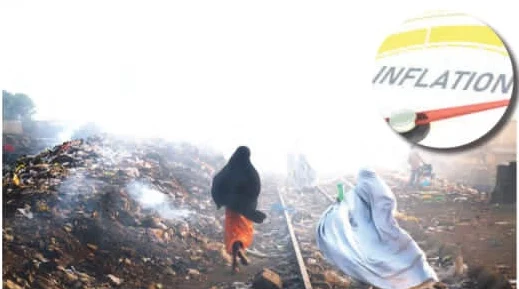Imagine the entire population of Cameroon or the entire population of The Ivory Coast having to face acute hunger 6 months from now. That’s the number of Nigerians that may endure hunger six months from now if Nigeria does not take urgent action to reduce rising conflicts and continually biting inflation across the country.
This is based on a report recently released by Cadre Harmonisé, a government-led and UN-supported food and nutrition analysis carried out twice a year.
25 million Nigerians in acute hunger is a projected increase from the estimated 17 million people currently at risk of food insecurity. The factors that threaten Nigeria’s food security are mainly man-made.
Continued conflict, climate change, inflation, and rising food prices are key drivers of this alarming trend. Food access has been affected by persistent violence in the north-east states of Borno, Adamawa, and Yobe (BAY) and armed banditry and kidnapping in states such as Katsina, Sokoto, Kaduna, Benue, and Niger.
Climate change is also a major threat to food security in Nigeria. According to the National Emergency Management Agency, widespread flooding in the 2022 rainy season damaged more than 676,000 hectares of farmlands, which diminished harvests and increased the risk of food insecurity for families across the country. Flooding is one of the effects of climate change and variability impacting Nigeria. More extreme weather patterns affecting food security are anticipated in the future.
The food security situation was dire before, and the ongoing flooding has made it worse. But recent flooding has had a devastating impact on food security. These can show policymakers how to make the connection and do something about it.
Commenting on the impact of the recent nationwide flooding, a researcher at Queens University, Ontario, Adaku Echendu, said food production levels in Nigeria are already below demand. Nigeria relies on $10 billion of imports to meet its food and agricultural production shortfalls (mostly wheat, rice, poultry and fish). This is even though agriculture is the second most important economic activity after crude oil.
“Flooding makes the situation worse. Flooding degrades the environment and destroys crops, farm settlements, livestock, and seedling stores. This reduces harvest and affects the next planting season, culminating in a food shortage crisis.
“Livestock is killed or lost pastures and inundated farmlands are unsuitable for cultivation. Depending on the type of sediment deposited on farmlands during floods, some can’t be cultivated for a long time, creating a cycle of food scarcity and hunger.
“Aquaculture and fish farming are not spared either. For instance, floods wash away fish stock, leading to a loss of income for the farmers and a loss of a valuable source of protein,” she said.
Commenting on access to food, Echendu said flooding has an impact on access to food in several ways; food becomes more scarce, hard to physically obtain, and more expensive.
“Smallholder farmers – who make up 88 per cent of Nigerian farmers – cultivate, process, and eat directly from their farms. They are the worst affected by flooding disasters. As found in my research review, they lose their primary source of income while lacking the resources to purchase food in the market. This also sets off a cycle in which high costs mean farmers can’t buy seeds or seedlings, affecting their ability to produce.
“Flooding can cause massive damage to infrastructure, like the collapse of bridges and roads in Nigeria, cutting off physical access. This has many knock-on effects. For instance, farmers can’t access needed inputs (like seeds or fertilisers) and markets for their goods. In addition, there are supply chain disruptions, increased prices, the destruction of farm produce and stored reserves.”
Inflation will also no doubt contribute in no small way to the looming food insecurity. As of October 2022, Nigeria’s year-on-year food inflation stood at 23.72 per cent. As of November 2022, food inflation stood at 24.13 per cent, but tapered to 23.75 per cent in December, according to the National Bureau of Statistics (NBS). Meanwhile, wages have generally stagnant or reduced. Moreover, unemployment has risen to 33 per cent, officially.
“The food security and nutrition situation across Nigeria is deeply concerning,” said Mr. Matthias Schmale, the Resident and Humanitarian Coordinator for Nigeria. “I have visited nutrition stabilisation centers filled with children who are fighting to stay alive. We must act now to ensure they and others get the lifesaving support they need.”
Children are the most vulnerable to food insecurity. Approximately 6 of the 17 million food-insecure Nigerians today are children under 5 living in Borno, Adamawa, Yobe, Sokoto, Katsina, and Zamfara States. There is a serious risk of mortality among children attributed to acute malnutrition. In the BAY states alone, the number of children suffering from acute malnutrition is expected to increase from 1.74 million in 2022 to 2 million in 2023.
The north-west region, around Katsina, Zamfara, and Sokoto States, is an increasing food insecurity and malnutrition hotspot. An estimated 2.9 million people are currently critically food insecure (Cadre Harmonisé Phase 3 or worse.) This figure is projected to increase to 4.3 million in the lean season if urgent action is not taken.
A lecturer in the Department of Agriculture, Ladoke Akintola University of Technology, Charles Igboga, said although acute food insecurity is affecting mainly the northern part of Nigeria, he noted that if the north is affected the entire country is affected because the northern states constitute the food basket of the nation. He added that food scarcity in the north would invariably affect prices in other parts of the nation.
He noted that hunger would be spread across other parts of the country due to high inflation.
Godwin Akhomolafe, an agronomist, said the government needs to adopt a comprehensive policy on food and agriculture. Akhomolafe said Nigeria does not even have food reserves to last more than three days because there is no comprehensive policy on food and agriculture, which exposes the larger population to the threat of hunger whenever something untoward happens in the country.
Justus Kemakolam, an agriculture economist, said no matter the gains in the policy focus area of food production, a single flooding event can reverse them. “The Nigerian government must pay more attention to disasters such as flooding – set to rise in the coming years due to climate change – in food security policies, and take immediate actions to control flooding. A more comprehensive approach to addressing food insecurity is needed and this must encompass flood prevention and mitigation.
“Many food security programmes and policies currently focus on food availability by seeking to increase production while neglecting other areas. This is also the approach in Nigeria, where production alone has formed the focus of food policies. The lack of consideration of the role of climate change in food insecurity is a significant oversight that needs to be addressed,” he said.





